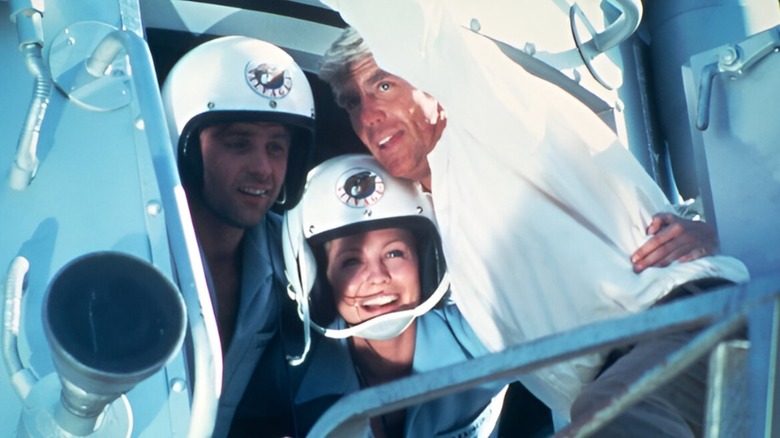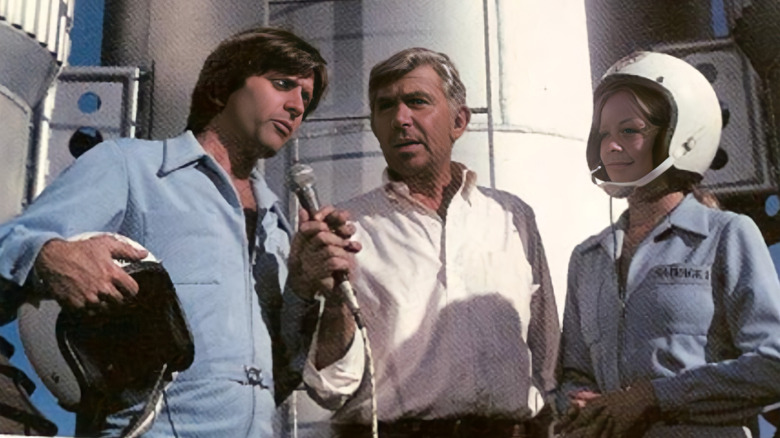Sci-Fi Legend Isaac Asimov Consulted On An Overlooked Andy Griffith Series
You might've heard of David S. Goyer and Josh Friedman's "Foundation," the Apple TV+ series that revolves around an interstellar empire ruled by three men (who might or might not be the same person at different stages of their lives). This unusual premise is filtered through the lens of science fiction and is based on Isaac Asimov's eponymous novel series, published between 1951 and 1993. Asimov's writing style has always been distinct yet accessible — he writes the kind of popular science fiction that avoids abstractions, allowing even the most complex concepts to be dissected with ease. While this is also true for his "Foundation" novels, the scale of the premise is ginormous, where the titular organization wishes to usher in a new historical cycle for mankind. The Apple TV+ series takes a more heavy-handed route that doesn't always work, but it emerges as a compelling adaptation of Asimov's source material so far.
"Foundation" might be one of Asimov's more widely famous titles (apart from "I, Robot," which prompted a meme-able Alex Proyas Hollywood adaptation), so there's a chance that several adaptations of his work have slipped through the cracks unnoticed. Then there are shows that Asimov personally supervised, even though they are based on stories by fellow genre authors (who obviously benefited from the Asimov endorsement). This is the case with ABC's "Salvage 1," a 16-episode series based on Orson Scott Card's ("Ender's Game") 1986 short story, "Salvage," which belongs to a pretty obscure part of his oeuvre.
Card's story is set in post-apocalyptic America, where a certain Deaver Teague (wild name, by the way) survives by salvaging pre-war materials, but knows that this career isn't a sustainable one. Talks about hidden gold inside a Mormon temple pique Teague's interest, so he decides to head out on this adventure with two of his friends, who seem somewhat reluctant but humor him anyway. Whatever can happen next? Well, ABC's "Salvage 1" expands upon this simple premise, incorporating Asimov's input to map a decent tale about greed and betrayal.
Salvage 1 is a super obscure series that Asimov helped shape to an extent
To air a quirky sci-fi adjacent series on television was a risk from a financial standpoint, so "Salvage 1" quickly faded into obscurity after 16 episodes (with no follow-ups of being renewed for a second season). Asimov's endorsement (which can be traced back to Card's short story being originally published in 1986's "Asimov's Science Fiction" magazine) wasn't enough to save the show, but his role as science advisor helped hone some of the flatter aspects of the narrative.
As you might've gleaned from the brief synopsis of Card's short, it doesn't have much meat on its bones, especially for a multi-season show that needs to constantly reinvent itself to keep things interesting. But the limitations of "Salvage" as a source material are inadvertently bypassed by a brilliant Andy Griffith, who plays Teague (renamed 'Harry Broderick,' because of course it was) with a brand of passionate zeal that the character most certainly does not deserve.
Some convincing details liven up his arc, such as the fact that he dreams of salvaging discarded equipment from NASA's Space Program, and succeeds in doing so. There's a space rocket powered by a made-up fuel named mono-hydrazine, which Harry builds with his team by taking a crude, DIY approach. Things get silly, and there's little emotional complexity to any of the characters to distract us from the nothingburger plot stretched thin over 16 episodes.
As I've already mentioned, Griffith is the MVP here, as his presence injects the lackluster premise with the charm required to help you breeze through the episodes. What's more, you can clearly identify some commendable themes here, including the critique of a broken economy brought forth by blind faith in superstructures and a cloying sense of optimism. These ideas, however, aren't allowed to develop and bloom, as ABC rushed production after the success of the pilot (in this case, a well-received TV movie), which took a more intelligent approach to the story. Due to the lack of quality scripts, even Asimov's genre expertise did little to help elevate "Salvage 1" beyond mediocre genre fare, and the series became relegated to the dusty cobwebs of time.

